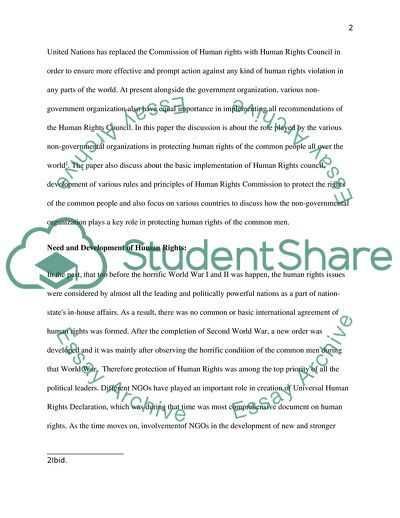Cite this document
(NGOs and Implementation of Human Rights Essay Example | Topics and Well Written Essays - 4000 words, n.d.)
NGOs and Implementation of Human Rights Essay Example | Topics and Well Written Essays - 4000 words. https://studentshare.org/law/1820034-critically-discuss-the-role-of-non-governmental-organisations-in-the-effective-implementation-of-international-human-rights-law-particularly-in-light-of-united-nations-reform-of-replacing-the-commission-on-human-rights-with-the-human-rights-council-hrc
NGOs and Implementation of Human Rights Essay Example | Topics and Well Written Essays - 4000 words. https://studentshare.org/law/1820034-critically-discuss-the-role-of-non-governmental-organisations-in-the-effective-implementation-of-international-human-rights-law-particularly-in-light-of-united-nations-reform-of-replacing-the-commission-on-human-rights-with-the-human-rights-council-hrc
(NGOs and Implementation of Human Rights Essay Example | Topics and Well Written Essays - 4000 Words)
NGOs and Implementation of Human Rights Essay Example | Topics and Well Written Essays - 4000 Words. https://studentshare.org/law/1820034-critically-discuss-the-role-of-non-governmental-organisations-in-the-effective-implementation-of-international-human-rights-law-particularly-in-light-of-united-nations-reform-of-replacing-the-commission-on-human-rights-with-the-human-rights-council-hrc.
NGOs and Implementation of Human Rights Essay Example | Topics and Well Written Essays - 4000 Words. https://studentshare.org/law/1820034-critically-discuss-the-role-of-non-governmental-organisations-in-the-effective-implementation-of-international-human-rights-law-particularly-in-light-of-united-nations-reform-of-replacing-the-commission-on-human-rights-with-the-human-rights-council-hrc.
“NGOs and Implementation of Human Rights Essay Example | Topics and Well Written Essays - 4000 Words”. https://studentshare.org/law/1820034-critically-discuss-the-role-of-non-governmental-organisations-in-the-effective-implementation-of-international-human-rights-law-particularly-in-light-of-united-nations-reform-of-replacing-the-commission-on-human-rights-with-the-human-rights-council-hrc.


